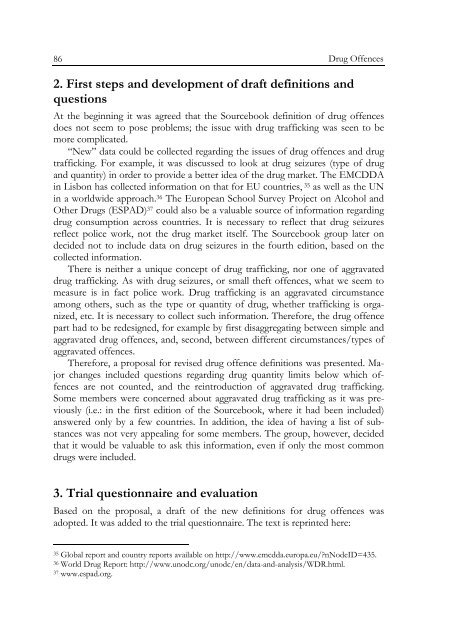Defining and Registering Criminal Offences and Measures - Oapen
Defining and Registering Criminal Offences and Measures - Oapen
Defining and Registering Criminal Offences and Measures - Oapen
You also want an ePaper? Increase the reach of your titles
YUMPU automatically turns print PDFs into web optimized ePapers that Google loves.
86<br />
2. First steps <strong>and</strong> development of draft definitions <strong>and</strong><br />
questions<br />
Drug <strong>Offences</strong><br />
At the beginning it was agreed that the Sourcebook definition of drug offences<br />
does not seem to pose problems; the issue with drug trafficking was seen to be<br />
more complicated.<br />
“New” data could be collected regarding the issues of drug offences <strong>and</strong> drug<br />
trafficking. For example, it was discussed to look at drug seizures (type of drug<br />
<strong>and</strong> quantity) in order to provide a better idea of the drug market. The EMCDDA<br />
in Lisbon has collected information on that for EU countries, 35 as well as the UN<br />
in a worldwide approach. 36 The European School Survey Project on Alcohol <strong>and</strong><br />
Other Drugs (ESPAD) 37 could also be a valuable source of information regarding<br />
drug consumption across countries. It is necessary to reflect that drug seizures<br />
reflect police work, not the drug market itself. The Sourcebook group later on<br />
decided not to include data on drug seizures in the fourth edition, based on the<br />
collected information.<br />
There is neither a unique concept of drug trafficking, nor one of aggravated<br />
drug trafficking. As with drug seizures, or small theft offences, what we seem to<br />
measure is in fact police work. Drug trafficking is an aggravated circumstance<br />
among others, such as the type or quantity of drug, whether trafficking is organized,<br />
etc. It is necessary to collect such information. Therefore, the drug offence<br />
part had to be redesigned, for example by first disaggregating between simple <strong>and</strong><br />
aggravated drug offences, <strong>and</strong>, second, between different circumstances/types of<br />
aggravated offences.<br />
Therefore, a proposal for revised drug offence definitions was presented. Major<br />
changes included questions regarding drug quantity limits below which offences<br />
are not counted, <strong>and</strong> the reintroduction of aggravated drug trafficking.<br />
Some members were concerned about aggravated drug trafficking as it was previously<br />
(i.e.: in the first edition of the Sourcebook, where it had been included)<br />
answered only by a few countries. In addition, the idea of having a list of substances<br />
was not very appealing for some members. The group, however, decided<br />
that it would be valuable to ask this information, even if only the most common<br />
drugs were included.<br />
3. Trial questionnaire <strong>and</strong> evaluation<br />
Based on the proposal, a draft of the new definitions for drug offences was<br />
adopted. It was added to the trial questionnaire. The text is reprinted here:<br />
35 Global report <strong>and</strong> country reports available on http://www.emcdda.europa.eu/?nNodeID=435.<br />
36 World Drug Report: http://www.unodc.org/unodc/en/data-<strong>and</strong>-analysis/WDR.html.<br />
37 www.espad.org.

















